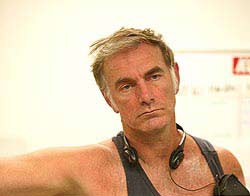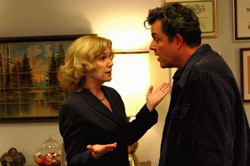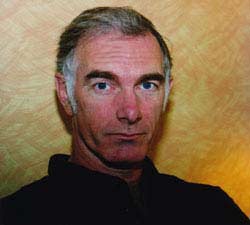
John Sayles Interview
07 January 2009Writer-director John Sayles picked the Mountain State as a microcosm of American politics for satire 'Silver City'
(Some questions in this interview have come from another journalist present for the Q&A.)
Overlooking San Francisco from the 46th floor restaurant of the Hilton Hotel, John Sayles surveys the amazing view and is reminded of one of the things he likes best about the city -- its diversity.
"I remember walking the length of San Francisco once, on one of the streets that just keeps going, and just seeing the city change every three blocks," he says, "going from pretty swanky to funky, then to a different ethnicity, then back up again, then back down again. It's amazing."
It's the kind of detail that the writer-director revels in, and it's one of the elements that makes his movies unique. Each one is set in a very specific locale -- "Lone Star" in West Texas, "Sunshine State" on a quiet Florida island threatened by development, "Limbo" in Alaska -- and Sayles always incorporates into his stories the personality and social minutia of the places he chooses.
For "Silver City" -- a mordant satire of Bush-era politics and spineless journalism in which the discovery of a corpse that could be linked to corporate corruption sets off a panic in the gubernatorial campaign of an inarticulate puppet candidate (a sly, Bush-mimicking Chris Cooper) -- the robust, reflective, 54-year-old filmmaker settled on Colorado. Having grown up there myself and recognizing how much of the state's culture he got right, when we sat down to talk about the film, the first thing I wanted to know was...
| Q: Why did you choose Colorado? |
A: There's this very basic thing: it's a beautiful, beautiful state. Many people move there because it's a beautiful, beautiful state. And because of the mining industry, underneath it there's a lot of poison. Fourteen miles from Denver is Rocky Flats, where they used to make triggers for nuclear bombs. Now they call it a "wildlife preserve" because human beings can't set foot on it. If you go up to Leadville, it's spectacular country. But most of the people who live there get in busses and go over to Vail or Aspen and work because they can't afford to live in (Vail or Aspen). Plus there's that nice duality of the state where you have Colorado Springs, where all the Christian fundamentalist groups and family groups have their headquarters, and (where there's the Air Force) Academy, and then you can have (liberal) Boulder -- "The People's Republic of Boulder" -- in the same state. And then Denver's right in the middle of that.
| Q: I grew up in Boulder, and that was my guess, because what you have there, in terms of the politics of this movie, is a microcosm of the United States. |
A: I often scout a place when I'm thinking about writing about it -- talk to people there and get some of the local details. How do things work here and what are the issues here? There is still this mindset (in Colorado) about being a cowboy or a miner and very Libertarian and open spaces and "don't tell me what to do." But cattle and mining are something like two percent of the economy of the state anymore, but people think of themselves as those kinds of people. You know, they get their shoes dirty.
| Q: It's two percent of the economy, but it's part of the mystique. |
A: Yeah. It's part of what you sell to tourists and people who want to move there. Denver has this loft thing happening...they're building new buildings that look like old factories and putting apartments in them. And we were in one (for a location in the movie) that hadn't quite opened yet, which was the "Jack Kerouac Lofts." I figured that if you lived there, you should have a lot of wine parties and then skip without paying your rent. You know, in the spirit of Jack Kerouac.
| Q: How much Bush research did you do? |
A: Some of it was just a lot of research about what's going on. I read some websites and Greg Palast's book, and some of Michael Moore's stuff, and a lot of Molly Ivins -- she went to high school with George W. Bush, and is very funny and a good writer. I read the "The Bush Dyslexicon," which is about his way of speaking and I tried to listen to his speeches and get exactly how he does it -- he has this kind of fractured way of speaking when he's off the script -- and what is it that they give him to say when he's on the script.
I had known some of this stuff from before just by being interested in politics. I read quite a bit about him when he was running for governor of Texas. That's really the analogy: (Cooper's character) is a neophyte, he comes from a political family, and he was never really into it. They came to him and said, "We want to run you." He said, "OK. I'm not doing anything else."
So I thought...this is going to be about a guy, it's his first time out. By the end of the movie, he's on the script and he's getting pretty good at it. He realizes what seems to work. I did quite a bit of research about things like how do you mine gold and silver too (a pivotal, very Colorado part of the plot), so that stuff makes sense. With every movie I do I try to do a lot of research so I feel comfortable that I'm not making something up that would never happen. There are some very heavy, right-wing radio networks in Colorado, so I went on some of those shows...
| Q: They had you on these shows? |
A: Yeah, yeah. A couple times -- with stuff they wanted to talk about. 'Cause some of the stuff I do could almost go Libertarian, so there might be some meeting ground on some of this stuff. You can get Pat Buchanan to agree with you on some things, because he thinks they're fascist too. Too much government outsourcing, for instance. Don't talk about building jobs for Americans and how patriotic you are if you take all the jobs in your company and go to India or somewhere else. Those people are doing a good job, probably. But don't say that you're patriotic when to save a buck you're doing that.
| Q: Speaking of the research, Chris Cooper did an incredible job being a proxy for Bush. Was it difficult to find a balance between how blatant to be and how ironic to be? |
A: Well, no. As written, there are a lot of similarities -- but mostly syntactical ones. He has a father who's a big politician as well, and he has this ruthless campaign manager...
| Q: ...and the kind-of nervous mannerisms. |
A: Yeah, and Chris is somebody who used to horrify his wife by (mimicking) Bush's attitude. But we didn't want an impression, which is a very, very different thing. With an impression, you take certain things and you multiply them by 20. You do much more John Wayne than John Wayne ever did. You exaggerate things. What I wanted was the basic things: How does this guy see the world? Is he an original thinker, or is he somebody who is user-friendly? He is a believer. He doesn't say anything he doesn't believe. They got the right guy, in that way. But he's not an original thinker. He's not insightful, and he's not good at the other part of the job, which is communicating. Ronald Reagan was not an insightful thinker. He didn't make up any of his policies; people told them to him. But he also thought they were good polices, and he was a professional spokesman. He was a much better spokesman than he ever was an actor.
Bush isn't very good at that. They've gotten him into that thing -- what's the word they used about George Wallace? Pusillanimous. They think that that's selling. And if they control it, sometimes it does. As long as somebody's blowing something up against Americans the day before, he can do that very sharp thing. In other cases it just seems like overkill and that he's a little thin-skinned. They try to control his brushes with the press so that the thin-skin thing doesn't come through.
| Q: So what did you tell Cooper you wanted from his candidate role? |
A: I write a bio for every character, and I gave Chris the bio for this character, which had some factual information that's not in the script. But also the way the character sees the world. Sometimes I'll write a 3-page short story in that character's point of view, just to get the way they look at things. But when you hire good actors, you can really do yourself a favor in the early days of a performance, and especially the early takes -- you just sit back and see what they're going to do. Don't give them too much more information, because they're going to come up with interesting stuff.
Now, you may want to bend it or, in the case of a really good actor, say "Now give me three of those and three of something else. Give me three where he's more angry or more clueless or just uncomfortable." When you have that kind of range of performance within a certain scene, you can go into the editing room -- and that's one great thing about working with good actors who give you some different colors -- you can go into the editing room and say, "You know, there's an arc to this character, and I don't want him too confident yet." I've got a couple of these where he looks confident and a couple where he looks like he's still feeling his way around -- let's keep him feeling his way around until this scene and then I can use the more confident thing.
| Q: I'm sure the buzz about this movie is inevitably going to be all about the politics, but Danny Huston's performance is so full of complexities as the disgraced ex-reporter detective (who is hired by the campaign to intimidate a short list of potential saboteurs they think planted the dead body). |
A: (The character) not especially together or competent at the beginning...
| Q: He's gone from being this passionate loose cannon as a reporter, which is what lost him his job in the first place, and now he's completely disenchanted and even kind of sad. |
A: Oh, yeah. He's a loser. That's how he thinks of himself. At the end he has lost, literally, but he's gotten something back, which is his sense of moral outrage. Danny did a nice job of his voice and his body language getting a little more substantial as the movie goes on.
| Q: And Daryl Hannah is fantastic (as the candidate's hard-living black-sheep sister)... |
A: I've always liked Daryl. One of the things you realize when you watch movies that there are some parts that seem like you have to be pretty. But then you see a movie where the actor is just pretty, and it doesn't work. So you realize that in something like "Splash" -- she really did a great job in "Splash." You couldn't just be a pretty girl and do that part. She's a good physical actor. So she's somebody whom I always felt was underused in a way. One of my ideas when I had her in "Casa de los Babys" was to have the other women in the group kind of react to her the way that I think other directors did, which is, "she's blond and perfect, so we'll just kind of throw her on the screen and not give her a character to play because that's enough." They don't realize there's more there. I think Quentin Tarantino has done some interesting stuff with her. (In "Kill Bill") she has a nasty, physical character. It's not especially deep, but once again, you can't be just a pretty girl and do that.
| Q: And then Billy Zane (as a lobbyist whose loyalty is for sale to the highest bidder), who is the kind of actor who has to be strategically cast. He doesn't have a wide range, but he's really good when he's in the right part -- and this is just so much the right part. |
A: You have to feel like this guy is really good at what he does -- that he's smart enough to pull it off. That he really could come out and say, "cigarettes have nothing to do with cancer" -- but if he had a different employer he could come out and say, "we know cigarettes cause cancer." And he could feel right about it -- I'm a professional. I'm a mercenary. This is the job, and I will do a good job at it. He's a very smart actor.
Contactmusic
Top 10 Videos
Wallace Chung
XXX
1
10 Years
Beautiful
2
Fast Girls
Fast Girls
3
Shaggy
Hey Sexy Lady
4
Air
Sexy Boy
5
The Staves
Tired As F***
6
Robin Thicke
Blurred Lines (Unrated Version)
7
All That Remains
Six (Live)
8
Fugees
Boof Baf
9
Fleur East
Sax [Live]
10
Movies and Trailers

Corman's World: Exploits Of A Hollywood Rebel Movie Review
An essential documentary for movie fans, this exploration of the work of iconic filmmaker Roger...

Silver City Movie Review
What are they using on the moviemaking plantation this election year to have produced such...

